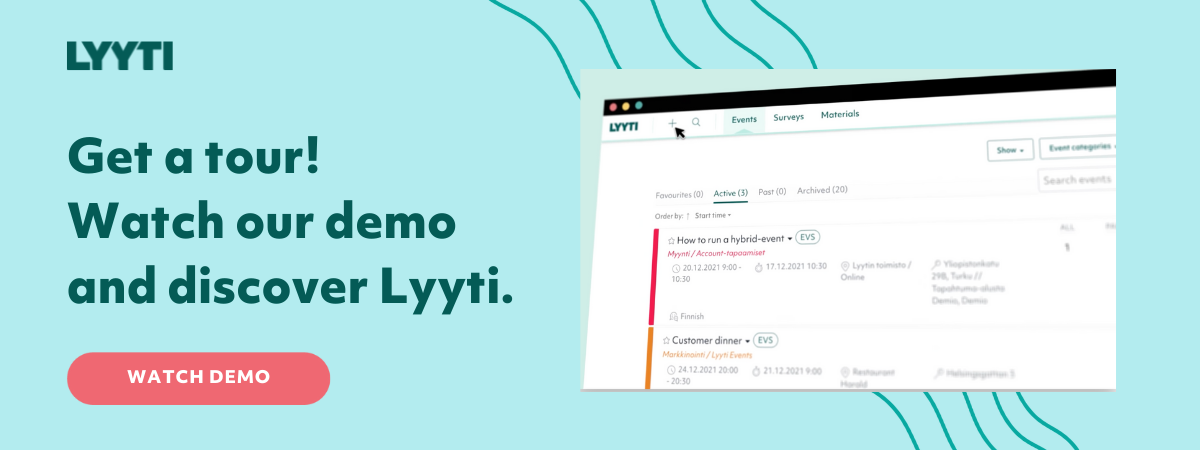Understanding how attendees have viewed an event is crucial information in analysing its success. Event organisers have always tried to gather this important feedback, and have tried many different ways.
Often, a custom survey just for that event is created and sent to attendees. This creates a work overhead, both in the creation and the processing of submitted replies. Response rates can be low to custom surveys. Custom surveys also mean you can’t reliably compare responses across different events since different questions are asked.
This has led event organisers to look for other, simpler ways to measure their events. Two of the most common ways to approach this challenge are EVS and NPS which both use a single standard question to gather feedback.
What is the Net Promoter Score (NPS)?
NPS was created in 2001. It asks a single question, typically “On a scale of 0 to 10, how likely are you to recommend our business to a friend or colleague?”
The idea behind it was to encourage customers to give feedback on a company with a simple to respond question and allow companies to get understanding about their customer satisfaction.
It could be applied to a company, a product or a service. Since its launch, NPS has become one of the most popular ways to measure customer satisfaction.
What is the Experience Value Score (EVS)?
EVS was created and launched by Lyyti in 2020. It’s focused purely on events, and asks one question from event attendees at the end of an event “The event was worth my time”.
The most valuable thing an attendee can spend on an event is their time so asking them to rate it gives a genuine measure of how they feel about an event. The idea was to replace custom surveys which can ask many different questions and often get a poor response rate.
EVS is a single, easy to respond to question that encourages submissions. It’s a neutral question that can be applied to any event, which allows all events to use the same metric which means the success of different events can be compared.
The sending of the question and collation of the results are all done automatically by Lyyti.
Discover more about how it works.
What’s the difference between EVS and NPS?
In the plus column for NPS is how recognisable it is for recipients. It’s common in so many places, it feels familiar. However, its strength may also be its limitation. Since it can be used across so many different places, it has to have a general approach to the question and scoring that isn’t industry or product specific.
EVS is built solely with events in mind and is structured to generate data that is of the greatest value to event organisers. EVS is also built into an event management platform like Lyyti so it can be sent out automatically and receive the results with no extra effort.
EVS with Lyyti allows you to see the scores of similar events in your industry, so you can benchmark your success against others. EVS also fits perfectly into a model of continual event improvement known as “Event Success Management”. Discover more about Event Success Management and how EVS contributes to it.
What have people said about EVS?
NPS has that long established history and may seem like the easy option. Event managers looking to embrace the future of how events can succeed and improve will be adopting the Event Success Management framework.
When the University of Helsinki tested EVS, they got some very interesting results that showed NPS may not be giving them all the data they needed. The difference in response rate between EVS and NPS surprised the team, too.
Who should use EVS?
EVS is a useful tool for anyone that organises events, not only Event Managers. Ask yourself if any of these apply to you. If they do, then EVS will bring value to your events:
- You or your company organise(s) multiple events.
- You want to understand if an event succeeded in the eyes of the attendees.
- You want to gather data on your events without creating lots of extra work.
- You want data that helps you make decisions on how to improve your events.
- You want to understand how your event ranks against others organised in your company, and against industry benchmarks.
Any one of the above-mentioned criteria would be enough to make EVS the best option for gathering data about your events.
Conclusion - EVS or NPS
The pressure for success in events on event managers and other event organisers continues to grow. The best way to succeed in the long term is making data-based decisions.
EVS and NPS both have their advantages and both yield useful data. We believe, when thinking specifically about events, EVS brings focus data that is even more valuable.
EVS is a big improvement on custom surveys since it doesn’t require any extra work and allows for comparison across events.
We would argue that NPS is better suited to evaluate a company and its services as a whole, whereas EVS can evaluate encounters that individually contribute to the success of the company. Following both scores will give you a holistic understanding of the state of your business and the initiatives you run.
Hero photo by Towfiqu barbhuiya on Unsplash
Similar articles

Future of Events 2024: What we learned from our flagship event

Event Survey Software: Key Features for Effective Feedback Collection

Event Planning Checklist for Effective and Stress-Free Planning

Event Marketing KPIs: Metrics You Need to Track





